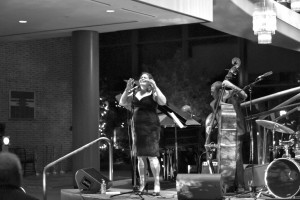Alex Alam
WVBU Senior Adviser
Monday morning was not business as usual for WVBU, the University’s student-run radio station. During some routine maintenance, a circuit board in the soundboard shorted out, briefly shutting down operations of the station.
“Fortunately we were able to at least get [the automation] to bypass the board, so there wasn’t a whole lot of dead air,” Station Manager Charlie Geitz ’15 said.
The station uses a dedicated automation system to be able to broadcast at all times, even when there are no DJs in the studio. Production staff were able to connect this system directly to the main output of the station to keep music on air.
“It almost sounded like nothing happened, which is good. The final broadcast is the most important thing,” Geitz said.
This incident comes shortly after the station was gifted with a new digital processor, courtesy of University alum Kathy Gilbert ’82. However, they were still left with a non-functioning console. While some staff tried to inspect the board to figure out what went wrong, others took to the station’s Facebook and Twitter accounts: “Even the station hates Mondays,” read one of the initial updates. A later Twitter post attempted to explain why this problem is significant: “… the mixer is the ‘heart’ of the station. It lets us take all the inputs (iPods, mics, etc) and send them where we want.” It soon became clear that they needed to send the faulty circuit boards off for repair, but the manufacturer was willing to ship temporary replacements.
For the time until the parts’ arrival, Production Directors Joe Duvall ’16 and Will Christner ’16, along with Alex Alam ’13 and staff engineer Todd Fogle were able to set up a temporary system so that DJs could still run their regular shows.
“It’s a little bit unorthodox, but we set it up so that [DJs] can go straight on-air from our recording studio,” Duvall said.
This new solution came with its own problems, as it required the use of an entirely different type of soundboard than most of the DJs were trained to use. With a little bit of hurried training, the affected staff performed impressively.
“People were able to pick it up pretty quickly … we’re lucky to have DJs that are good at what they do,” Duvall said.
“The whole mess has just been a lot of work on pretty much no notice,” Geitz said, “but that’s part of the job … the cool thing about radio is that it’s always going, so we have to stay on top of our game.”




